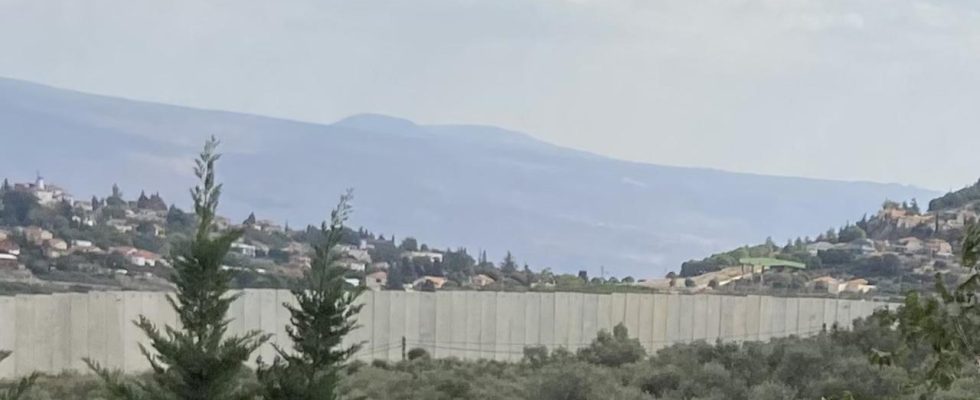report
The security situation in southern Lebanon has long been considered tense. But now hardly anyone lives in the region from which Hezbollah operates. The “second front” against Israel that experts warn about already seems to be a reality.
This is the last checkpoint before we head into the mountains to the Lebanese-Israeli border. Between the barbed wire and concrete blocks, a few soldiers from the regular army check the identity documents again. Behind it begins the buffer zone in which the Hezbollah militia operates. Dirt paths, roads that lead through valleys and over plateaus, past empty villages and farms.
Occasionally a white, armored vehicle from the UN observer force (United Nations Interim Force in Lebanon, UNIFIL) over. The blue helmets are registering the shelling here, which is increasing day by day – and with it the Lebanese’s fear of the great, devastating war.
If Hezbollah fires grenades across the Israeli border, the Israelis retaliate – or vice versa. For 17 years, this back and forth was a nasty but organized game in which both sides followed strict rules. There were rarely any deaths and when there were, the peacekeepers were told that it wasn’t meant that way. But that’s been over since October 7th.
Only a few hundred families remained
Almost 60 Hezbollah militiamen have reportedly already been killed. Drones and fighter jets are now in use on the Israeli side, and the Islamist Shiite militia has fired its first surface-to-air missiles. The second front, which military experts urgently warn about on talk shows, appears to have existed here for a long time. It’s not an open war yet, but everyone is preparing for it.
Almost 30,000 people have retreated from the towns near the border into the safe hinterland. The buffer zone is almost depopulated; despite everything, only a few hundred families remain. There is a danger of war, it is acute. But there is also your own land. The house, the olive trees, the vineyards.
Imad Khouri, an old farmer from the small town of Marshajun, says he simply cannot leave here and leave everything to the impending war. “Hopefully this will be the last war that I experience. Since my childhood – always war,” says Imad. “I’m from here, I grew up here. We finally need peace.” He doesn’t want anything more. “Before I go, I want to see this.” As he speaks, a jeep full of armed Hezbollah militiamen drives through the market square. Imad looks after them blankly.
Waiting for Nasrallah’s speech
From the small town of Marshajun we go along the border to the small town of Kfarkella. It is located on a hill directly on the demarcation line. Down in the valley, a gray, high wall stretches into the northern mountains, directly opposite – within shouting distance – an Israeli kibbutz. There was an exchange of fire here the day before. Hezbollah supposedly started it and the Israelis sent a few grenades back. An empty house and a few trees on the outskirts were hit. Now it’s quiet in Kfarkella, the shops are closed, only a street café is open.
Colleagues from the Lebanese state television Tele Liban are sitting at the table, with a camera and flak jackets underneath. They’ve been here since this morning, drinking tea, eating peanuts and waiting for something newsworthy to happen. What that could be will become apparent on Friday. Sheikh Hassan Nasrallah, Hezbollah’s secretary general and spiritual authority, will give a speech in Beirut that may decide the country’s fate.
“He will do the right thing for us,” says Zeinab Yassin, crisis reporter for Tele Liban. “We have the enemy on our doorstep. We can’t just sit still. Either we get into this war or we don’t. I trust Nasrallah.”
A financially and politically bankrupt country
Which basically says it all as far as the balance of power in Lebanon is concerned: the country is financially and politically bankrupt. What will happen to the Lebanese in the next few days and weeks is out of their hands. Not even in those of the provisional head of government, Nadjib Mikati, who revealed his political impotence in a recent interview: “Lebanon,” he said, “is in the eye of the storm. As far as I can tell, Hezbollah has been rational so far and dealt with it thoughtfully. But I can’t assure the Lebanese that it will stay that way.”
Whether the Gaza war remains contained or degenerates into a major war in the Middle East probably only a small circle knows at the moment: Sheikh Hassan Nasrallah and the mullahs’ regime in Iran, which supplies Hezbollah with ammunition.

